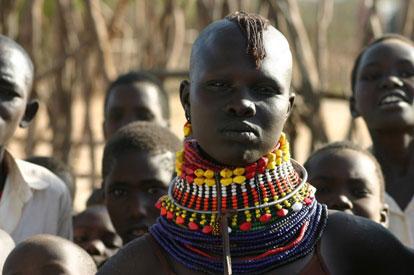Kenyan Village Celebrates Harvest

"We were without food, We were without hope, You saw our need, And God has provided."
In the village of Kyua, Kenya, there is a group of women who are dancing and singing this song. Theirs' is a joyful celebration of the arrival of rain and a bumper corn harvest. For the first time in five years, the village will harvest enough food to feed itself.
Eight months ago, in the midst of the worst drought Kenya has experienced in many years, the village of Kyua was nearly abandoned. Despite having fertile soil, nothing would grow without adequate rainfall, and people began migrating to the urban areas to look for work.
The women of Kyua decided things had to change. They joined the Christian World Relief Committee’s drought response project. Using funds from the Canadian Foodgrains Bank (CFGB) and Dorcas Aid International, CRWRC provided food and seeds to 10,670 families across Kenya - including Kuya. After several months, once people’s strength had returned, they were asked to work in exchange for additional food.
In Canada, this Sunday, March 7 is Canadian Foodgrains Bank Sunday. This will be a time to provide support for the work CRWRC can do with help from the Foodgrains Bank. For more information on the CRWRC’s involvement with the organization, visit, CFGB Sunday. Also available at the site are resources that could be included in this week’s worship service.
As part of the Kenyan "food for work" project, people planted trees that would provide shade and prevent soil erosion, and dug water catchment ponds and irrigation canals. All of these activities have increased the community’s resilience against future droughts.
Many of these activities are labour intensive. In order to meet this physical challenge, the women formed a group that would work together on each other’s farms. They have committed to dig one water pond on each member's property. This was a huge undertaking, but now that the short rains have come the ponds are full and are providing water to nearby vegetable gardens. The advantages of year-round water are obvious.
"Once we thought it was only possible to dig a pond with an excavator," says Mbetti, the community chair woman, "but now we see that we can dig it by hand. In fact we can do a better job than an excavator as we do not damage the land around the pond."
But needs remain. While Kyua has been blessed by rain-fall, in the Masai Mara area just 60 km away the rains did not come. The ground there is dry and the crops have failed. The people who live in this area have been severely affected by the drought. In some areas 80 percent of the cattle have died. These cattle represented people’s life savings and many are left with nothing.
Despite the failed rains, the people of Masai Mara continue to work hard as part of the food-for-work project, creating gardens and building a multi-purpose building that they hope will serve as a storage facility when they have a harvest. As the current drought response concludes, CRWRC is conducting assessments in the areas where the harvest failed in order to determine the ongoing needs. CRWRC will continue to walk alongside them in this difficult time.


